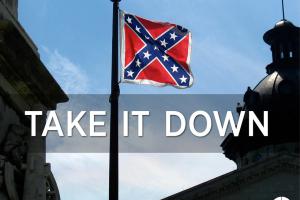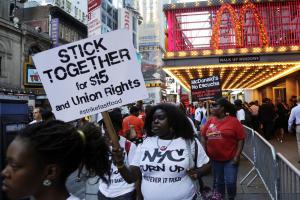The Surge Fallacy
The Atlantic
 The permanence of racial injustice makes the struggle for the future necessary today, says James Forman Jr. Over the next few weeks, The Atlantic will be publishing a series of responses to Ta-Nehisi Coates’s Between the World and Me. This is the first in a series. Readers are invited to send their own responses to hello@theatlantic.com, to follow along on Twitter at #BTWAM, or to read other responses to the book from Atlantic readers and contributors.
The permanence of racial injustice makes the struggle for the future necessary today, says James Forman Jr. Over the next few weeks, The Atlantic will be publishing a series of responses to Ta-Nehisi Coates’s Between the World and Me. This is the first in a series. Readers are invited to send their own responses to hello@theatlantic.com, to follow along on Twitter at #BTWAM, or to read other responses to the book from Atlantic readers and contributors.
 The meaning of the Confederate flag is best discerned in the words of those who bore it. In praising the Klan's terrorism, Confederate veterans and their descendants displayed a remarkable consistency. White domination was the point. Slavery failed. Domination prevailed nonetheless. The Confederate flag should come down because it is embarrassing to all Americans. The fact that it still flies, that one must debate its meaning in 2015, reflects an incredible ignorance.
The meaning of the Confederate flag is best discerned in the words of those who bore it. In praising the Klan's terrorism, Confederate veterans and their descendants displayed a remarkable consistency. White domination was the point. Slavery failed. Domination prevailed nonetheless. The Confederate flag should come down because it is embarrassing to all Americans. The fact that it still flies, that one must debate its meaning in 2015, reflects an incredible ignorance.
 With 1.3 million U.S. employees—more than the population of Vermont and Wyoming combined—Walmart is by far the nation’s largest private-sector employer. It’s also one of the nation’s most aggressive anti-union companies, with a long history of trying to squelch unionization efforts. “People are scared to vote for a union because they’re scared their store will be closed,” said Barbara Gertz, an overnight Walmart stocker in Denver.
With 1.3 million U.S. employees—more than the population of Vermont and Wyoming combined—Walmart is by far the nation’s largest private-sector employer. It’s also one of the nation’s most aggressive anti-union companies, with a long history of trying to squelch unionization efforts. “People are scared to vote for a union because they’re scared their store will be closed,” said Barbara Gertz, an overnight Walmart stocker in Denver.
 With 1.3 million U.S. employees—more than the population of Vermont and Wyoming combined—Walmart is by far the nation’s largest private-sector employer. It’s also one of the nation’s most aggressive anti-union companies, with a long history of trying to squelch unionization efforts. “People are scared to vote for a union because they’re scared their store will be closed,” said Barbara Gertz, an overnight Walmart stocker in Denver.
With 1.3 million U.S. employees—more than the population of Vermont and Wyoming combined—Walmart is by far the nation’s largest private-sector employer. It’s also one of the nation’s most aggressive anti-union companies, with a long history of trying to squelch unionization efforts. “People are scared to vote for a union because they’re scared their store will be closed,” said Barbara Gertz, an overnight Walmart stocker in Denver.
Spread the word